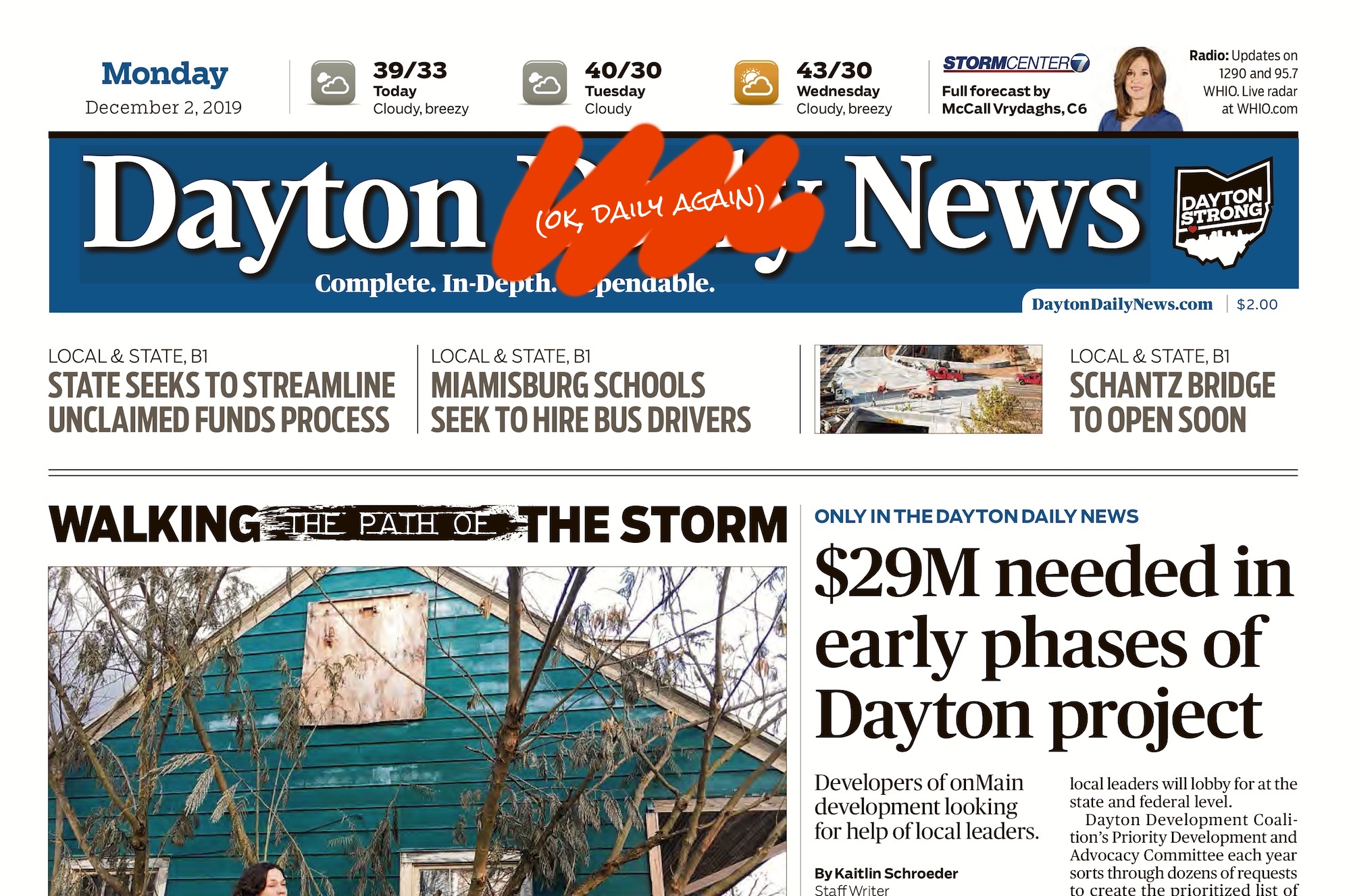
Apollo bought the Daily News along with a few other Dayton-area media properties Cox owned — two county-seat papers just outside town, the local CBS affiliate, and some radio stations. Normally, a city’s newspaper isn’t allowed to have the same corporate owner as one of its local TV stations — a 45-year-old FCC regulation aimed at protecting media diversity within a given market. But the Dayton newspaper+TV combo has been around since 1949, so the feds grandfathered the arrangement in. But selling to Apollo meant that old special exemption disappeared.
What to do? Well, Apollo — with all the public-spiritedness and sense of civic responsibility you might expect from a private equity firm run by a guy who hung out with Jeffrey Epstein for years — figured out a way to get around the need for an exemption. The FCC regulation only applied to daily newspapers. Federal rules defined “daily” as publishing at least four times a week. The obvious solution: only print the Dayton “Daily” News three times a week!
There are good arguments to be had about whether or not this sort of cross-ownership ban, passed in 1975, is still a good idea in 2020. (I’m of the opinion that struggling local newspapers aren’t in any position to “dominate” the market for news in anything like they were decades ago. And local TV, while facing plenty of challenges around audience loss and the switch to streaming, still makes a bunch of money. If someone wants to use local TV bucks to support local newspaper reporting, I’m game.)
But whatever your opinion on the matter, it’s clear the intention was never to somehow use federal regulation to encourage newspapers to print less often.
Well, happy day, a solution has been found, in back-to-the-future fashion. Cox is going to buy those newspapers back:
Atlanta-based Cox Enterprises on Monday announced it has reached an agreement to buy three Ohio newspapers, including the Dayton Daily News, that it previously agreed to sell as part of a deal to sell the company’s television stations.
The agreement solves a problem triggered by a recent federal court decision that threatened the ability of the Daily News, Springfield News-Sun and (Butler County) Journal-News to publish as daily papers. Cox Enterprises traces its roots to Dayton and founder James M. Cox’s purchase of what was then known as the Dayton Evening News in 1898.
“Dayton, Ohio, is a big part of the Cox DNA. It’s where our family is from and where our company was founded,” Alex Taylor, president and CEO of Cox Enterprises, said in a news release. “So, it is with great excitement that we continue publishing these papers as we have for more than 100 years.”
For those following at home, Cox Enterprises agreed to let Apollo buy Cox Media Group (with Cox Enterprises retaining a minority share in Cox Media Group). Now Cox Media Group will now sell the newspapers back to Cox Enterprises, which will retain its investment in Cox Media Group. It all makes perfect sense.
Cox used to be a sizeable newspaper chain, owning more than 20 dailies at various points, including in Atlanta, Miami, Austin, and Palm Beach. But it’s sold off everything but its largest paper, the Atlanta Journal-Constitution, in recent years, with Austin and Palm Beach going to GateHouse (now Gannett). Dayton will now rejoin that shrunken crew.
Cox Enterprises — founded by 1920 Democratic presidential nominee James M. Cox, who suffered an all-time crushing at the polls at the hands of fellow Ohio newspaper publisher Warren Harding — is one of America’s largest privately held companies, with annual revenues over $20 billion and 55,000 employees. (They’re now more likely to install cable in your condo than cover a school board meeting, though.) The price of the Daily News wasn’t announced, but it’s likely a rounding error of a rounding error.
(The last surviving child of James M. Cox, Anne Cox Chambers, died just 11 days ago at the age of 100. Before spreading her wealth among her heirs, her personal net worth was estimated at more than $16 billion.)
There will still be kinks to be worked out. The Daily News and the TV station, WHIO, “for years operated as one company in the same building…with shared news-gathering teams. With separate ownership, those relationships will now have to be either disentangled or formalized in a new business arrangement.
But all things considered, you’d rather have your local newspaper owned by a privately-held, still-family-run company that feels an emotional connection and sense of responsibility to your city than a gang of PE asset leechers. And now we know that, if the Dayton Daily News cuts its print days anytime soon, it’ll because they think it makes business sense, not because a federal regulation has been warped into forcing it.
Daytonians deserve in-depth local news coverage and I am so glad to see that the Dayton Daily News will continue to dig into important local stories every day.https://t.co/olf1hfYXCE
— Nan Whaley (@nanwhaley) February 10, 2020
The Journal-News and its sister papers up north will remain daily publications. https://t.co/evfu88Rq3c @journalnews
— Eric Schwartzberg (@eschwartzberg) February 10, 2020
Cox Enterprises buys back Ohio newspapers; 7-day publication continues. This is good news. The Dayton Daily News will continue as a daily after the old, new owners, were gonna muffle it. https://t.co/0mHZuO9Uff
— Paul Chambers🌊📢🏥🤡 (@feedingtubepaul) February 10, 2020